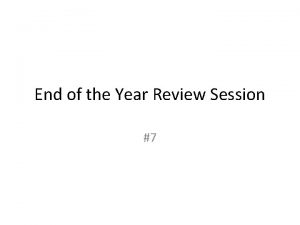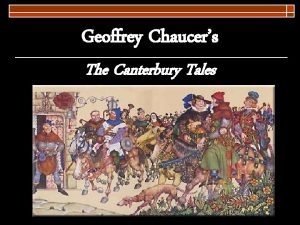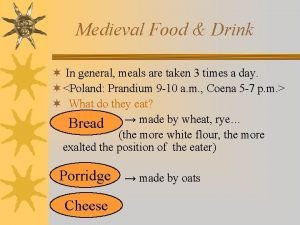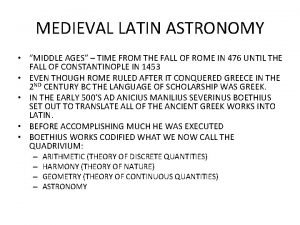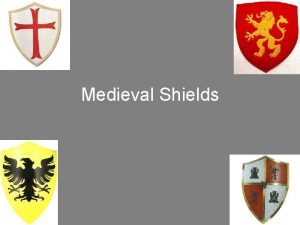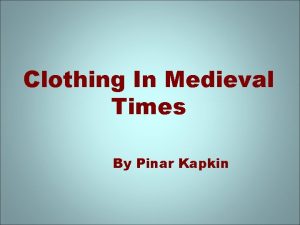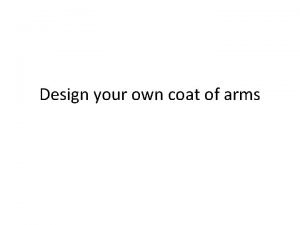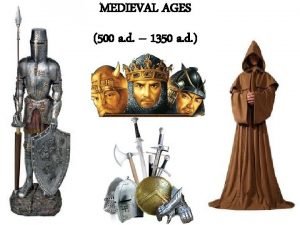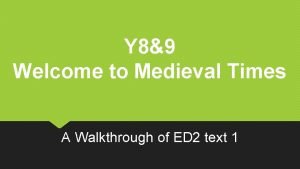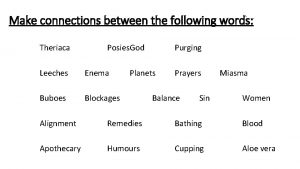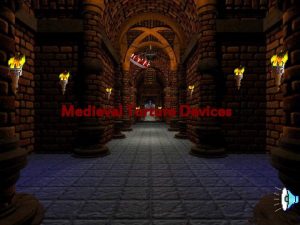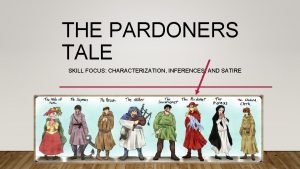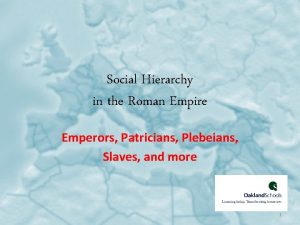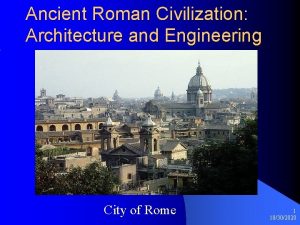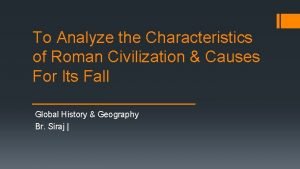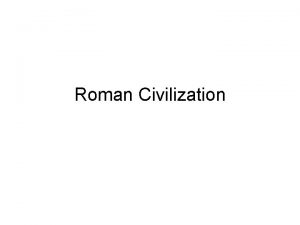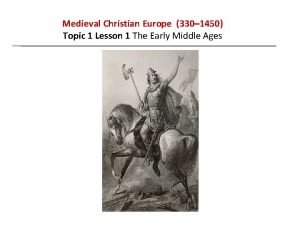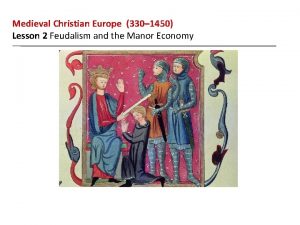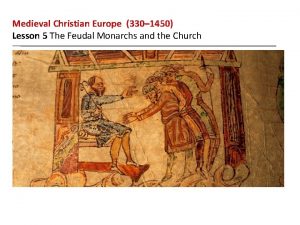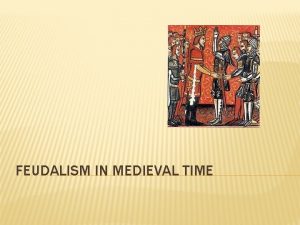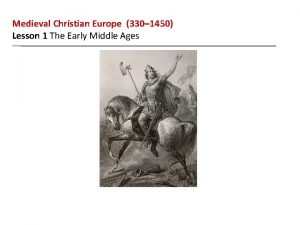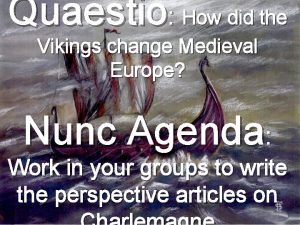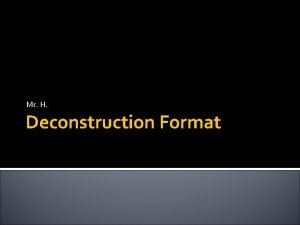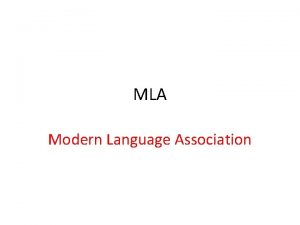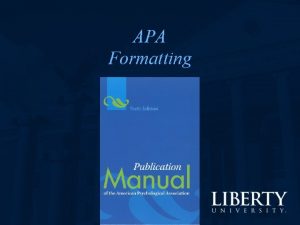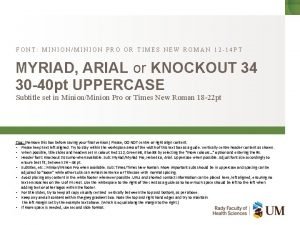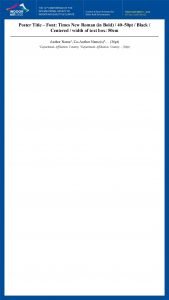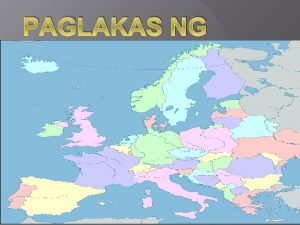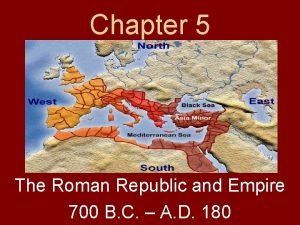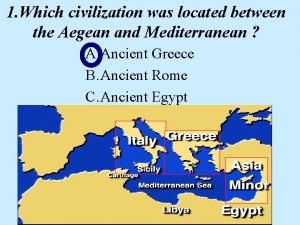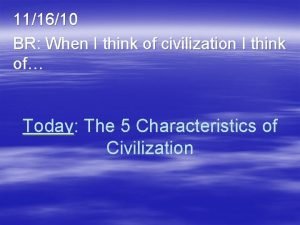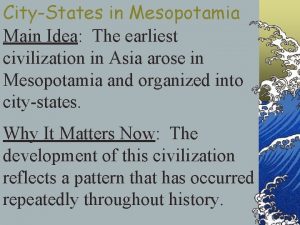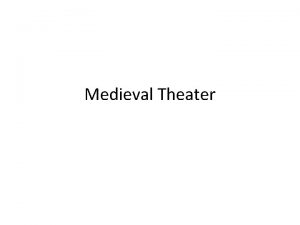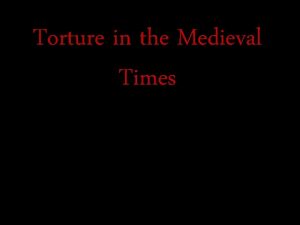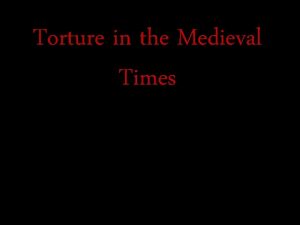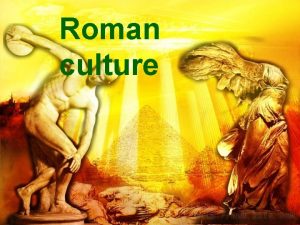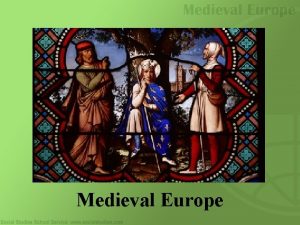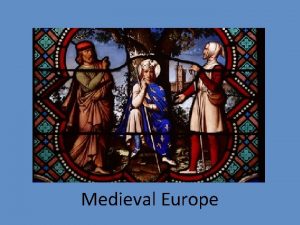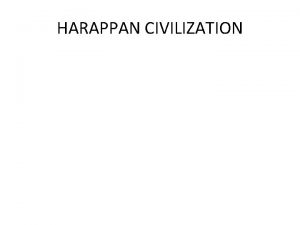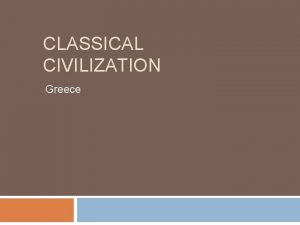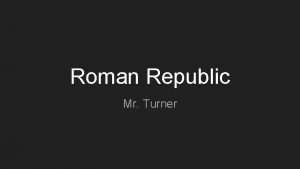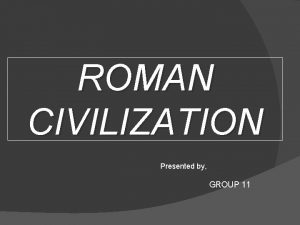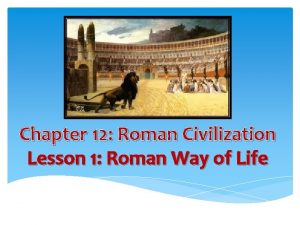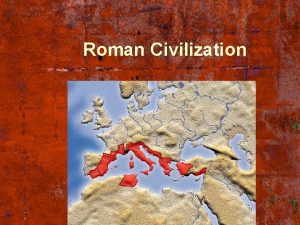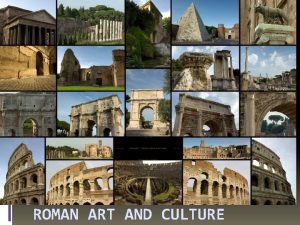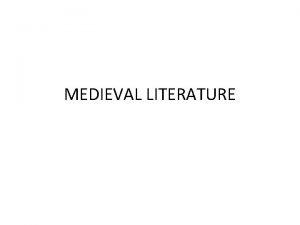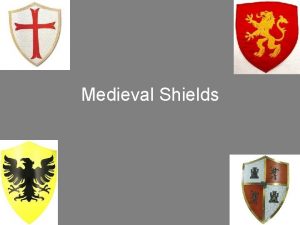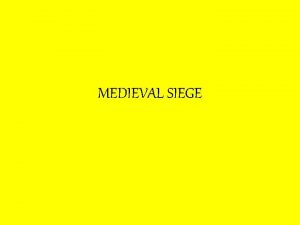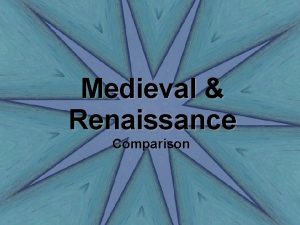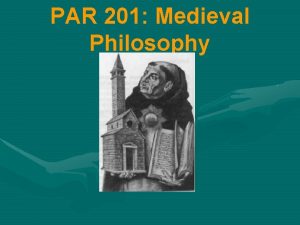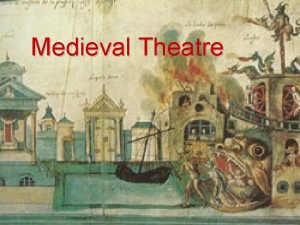Medieval Europe Medieval times As Roman Civilization declined



































- Slides: 35


Medieval Europe

Medieval times �As Roman Civilization declined, Europe became an isolated land of disunity, conflict and poverty. �People no longer had the Roman Empire to protect them and unite them �Between 400 and 700, Germanic tribes carved Western Europe into small kingdoms. �This signaled the beginning of the Medieval period

Europe before and after the fall of Rome Before After

Feudalism in Medieval Times

Feudalism �In Medieval Times, people lived difficult lives �It took a lot of work to simply survive �A political system called Feudalism was created to solve these issues

Stop and Think �Imagine a time before you could go to the store on the corner to buy the things you need to live. What types of activities would people in Medieval times need to do for themselves in order to be able to survive?

Feudalism �Feudalism is: � A system where people pledge loyalty to a lord or powerful land holder and in return receive land protection

Feudalism Continued �In Feudal society, people had distinct roles that they played �At the top was the King �Underneath the King were his nobles who he gave land to �Nobles allowed knights, peasants, and serfs to live on their land in exchange for their loyalty to the Noble �During the Middle Ages, people were born into a social class. They had the same social position, and often the same job, as their parents.


Roles in Medieval Society �The feudal system made sure each person played a distinct role for society to function. �Without any one person in the system, the society would fail

Roles in Medieval Society �King: The ruler of the land the one who was in charge of making decisions �Lord and Ladies- The noble men, or wealthy land owners who were given manors from the King. Ladies were their wives and daughters �Knights- the sworn protectors of the King and Lords �Peasants- worked the land �Serfs- Peasants who were not free to leave the land

Stop and Think �What other country did we learn about that had a feudal system? �How was that system alike or different than the one in Europe?

Feudal Scavenger Hunt �You travel in time to a Medieval Kingdom. You have never been here before and you are excited to meet as many different people as you can. �When instructed open up the slip of paper and learn about who you are �On the scavenger hunt page, fill in your role on the lines that are about you �Move around the room and meet everyone else, fill in their role on the scavenger hunt paper �Do NOT just say what number you are

The Age of Charlemagne

Charlemagne �Around 800, Western Europe was united when an emperor built a vast empire �The Emperor is known in history as Charlemagne, or Charles the Great. �He loved battle and conquered a lot of land, which reunited much of the old Roman Empire.

Charlemagne Continued �Charlemagne did many things to exercise control over his many lands and create a United Christian Europe. �He worked very closely with the church; he helped spread Christianity to conquered peoples. �He appointed powerful nobles to rule local regions.

Charlemagne Continued � Education had declined so much that even the clergy (members of the church) were sadly ignorant and uneducated. � Charlemagne himself could read, but not write. � He felt nobles and clergy needed to keep accurate records and write clear reports. � He founded a school and created a curriculum or formal course of study.

Charlemagne Continued �Charlemagne’s legacy is that he spread Christianity to various parts of Europe

Stop and Think �What were 3 big accomplishments of Charlemagne? �How do you think Europe would have been different without his rule?

The Church in Medieval Times

The Role of the Church �The church was the center of medieval life �Every town and manor had a church or cathedral �The church was a daily presence in people’s lives �People even measured how long to cook an egg based on how many prayers they said

The Role of the Church �Just like feudal society, the church had a very strict structure Pope Archbishop Bishops Priests Monks and Nuns

The Role of the Church �The church had incredible power �The only common language in Europe was Latin- The language of the church �Only church officials could read and write �The church could excommunicate people which meant throwing them out of the church �The church taught that the only way to salvation was through the sacraments

Stop and Think �Can you see any problems with the church having so much power?

The Crusades

The Holy Land �During the Middle Ages, Christians called Palestine/Israel the “Holy Land” because Jesus had lived there �Many Christians wanted to see the places that Jesus had visited �The Holy Land had been under Christian control, but was retaken by the Muslims who were living there �They soon began preventing Christians from visiting �Rumors spread around Europe that Muslims were killing Christians and destroying Churches

Pope Urban’s Call �In 1095, Pope Urban II called on all European Christians to join together to unite and fight the holy Crusades or wars against the Muslims �The Pope wanted to take the Holy Land back from the Muslims

The Crusades �Many European Christians made the long journey from Europe to the holy land to defeat the Muslims �There were seven crusades in total

Stop and Think �On your map, circle the holy land. �Then, trace the route from England to the Holy Land. �List some difficulties a crusader might face on making the journey.

The Crusades �Reasons people went on Crusades �To seek wealth �To guarantee their salvation �Deep religious beliefs

Impact of the Crusades �It is estimated that almost 1. 7 million people died on the crusades � This includes Christian crusaders and Muslims, as well as Jews who were massacred during the holy wars

Impact of the Crusades on Europe �Ended Feudalism: Kings grew more powerful as knights, nobles, and serfs left to fight which helped to eventually end feudalism �Advanced civilization: Europeans brought back new inventions and ideas such as algebra, the compass, and medicine �Increase in trade: Merchants became wealthy from trade with Muslims and new economic systems like banks and taxes developed

Effects of the Crusades on Muslims � Since most of Crusades were fought on Muslim land, they faced mass destruction and large death-tolls � There was a smaller long-term impact on the Muslims because Muslim society was much more advanced at the time � Learned about new weapons and military ideas � Merchants became wealthy because of trade with Europeans � Muslims became united against common enemy

Stop and Think �Which group “won” the crusades?
 The key to oneida's financial success was
The key to oneida's financial success was Factors of 168
Factors of 168 Canterbury tales medieval times
Canterbury tales medieval times Medieval times drink menu
Medieval times drink menu Astronomy in the middle ages
Astronomy in the middle ages Medieval shield designs
Medieval shield designs What did lords and ladies wear in medieval times
What did lords and ladies wear in medieval times Design my own coat
Design my own coat Medieval times commercial
Medieval times commercial Welcome to medieval times
Welcome to medieval times Theriaca medieval times
Theriaca medieval times Gossip's bradle
Gossip's bradle Medieval english translator
Medieval english translator Pardoner's tale summary
Pardoner's tale summary Roman republic social hierarchy
Roman republic social hierarchy Roman architecture and engineering
Roman architecture and engineering Characteristics of roman civilization
Characteristics of roman civilization Roman contributions to western civilization
Roman contributions to western civilization Soleae roman
Soleae roman Topic 1 medieval christian europe
Topic 1 medieval christian europe Feudal europe map
Feudal europe map Unit 8 lesson 5 medieval christian europe
Unit 8 lesson 5 medieval christian europe Medieval hierarchy
Medieval hierarchy Medieval kingdoms in europe lesson 1
Medieval kingdoms in europe lesson 1 How did the vikings change medieval europe
How did the vikings change medieval europe Times new roman h
Times new roman h Mla prefers times new roman font
Mla prefers times new roman font Is apa format times new roman
Is apa format times new roman Times new roman pro
Times new roman pro Poster title font
Poster title font Ano-anu ang dalawang uri ng bourgeoisie?
Ano-anu ang dalawang uri ng bourgeoisie? Roman republic vs roman empire
Roman republic vs roman empire Difference between roman republic and roman empire
Difference between roman republic and roman empire The earliest aegean civilization was located
The earliest aegean civilization was located 5 characteristics of civilization
5 characteristics of civilization The earliest civilization in asia arose in
The earliest civilization in asia arose in
